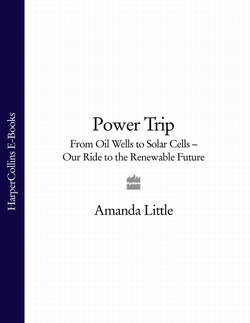Читать книгу Power Trip: From Oil Wells to Solar Cells – Our Ride to the Renewable Future - Amanda Little - Страница 30
THE PATRIOT
ОглавлениеJames Woolsey, the former chief of the Central Intelligence Agency under the Clinton administration, lives in a rambling farmhouse in rural Maryland. I arranged to meet with Woolsey after my Pentagon visit in the hope of getting a wider perspective on the marriage of war and oil. Woolsey is in many ways a consummate Washington insider—someone who served as one of the voices in the room when key decisions were made about America’s foreign policy in the Middle East. But since he left the CIA he has become a twenty-first-century Paul Revere, warning the public of the national security threats posed by America’s dependence on foreign fuel.
A dry-witted, sharp-featured brainiac who was a Rhodes scholar at Oxford and got his law degree at Yale, Woolsey, now in his sixties, spearheads an increasingly influential group of conservative and liberal experts alike inside Washington who argue that weaning America off foreign oil is the most ethical, effective, and affordable way to win the war on terror. This group is known as “cheap hawks.”
“Americans need to know that their oil demand is fueling Al Qaeda,” he told me as we ambled through a bare cornfield near his house. “Nearly $100 billion has been spent on spreading anti-U.S. propaganda around the Middle East, and almost all of that is oil money.”
To reduce the flow of those “billions for hate,” as Woolsey calls it, he and his fellow cheap hawks have advocated a demand-side reduction plan similar to the one President Carter promoted in the 1970s. Woolsey and other cheap hawks see alternative energy technologies as a tactical necessity—not just in the field of combat, but as a means of moving America at large off of oil. They have been pushing for federal policies promoting the widespread adoption of hybrid cars, renewable power, and fuels such as ethanol and biodiesel that are made from corncobs, garbage, manure, and switchgrass. A far cry from green idealists, cheap hawks come on strong as pragmatists.
War, reasons Woolsey, is a grossly expensive and inefficient way to defend America’s energy interests, and is becoming ever more so. “Our military energy burdens will only grow heavier as the war on terror demands more fine-tuned and complex tactics, including an ever more agile and dispersed force,” he told me, “and more extended deployment in the field.” Woolsey also cautioned that terrorism in the Middle East is much more likely to drive oil prices up than is peak oil. “The biggest threat to our economy in terms of oil dependence is the possibility of a terrorist strike against the oil and pipeline infrastructure in the Middle East. Overnight, we could see oil prices double or triple to $200 or $300 a barrel.”
But for all his caution and concern, Woolsey is an optimist who fervently believes in the power of technology to end America’s oil dependence and reduce the need for its military involvement in the Middle East. In fact, he has fashioned his own home into a kind of living laboratory of the types of practical solutions that he believes will dig the United States out of its energy crisis. He took me on a tour: the roof was rigged with solar panels, the walls and windows were double-insulated, the fireplaces were equipped with “heatilators” to ventilate warmth from the chimney, and the kitchen appliances were Energy Star–qualified—all of it serving to make the house electrically self-sufficient “in case of shortages or terrorist attack,” he said.
By far the most important and underutilized weapon in the war on terrorism, according to Woolsey, was the gleaming white plug-in hybrid Toyota Prius in his garage, which sported the bumper sticker “Bin Laden Hates This Car.” “The most immediate and important technology challenge for America right now is reforming our car fleet—that’s the biggest deadweight dragging on our oil demands,” he told me. “It’s not just our environmental duty to drive efficient cars, it’s our patriotic duty.”
